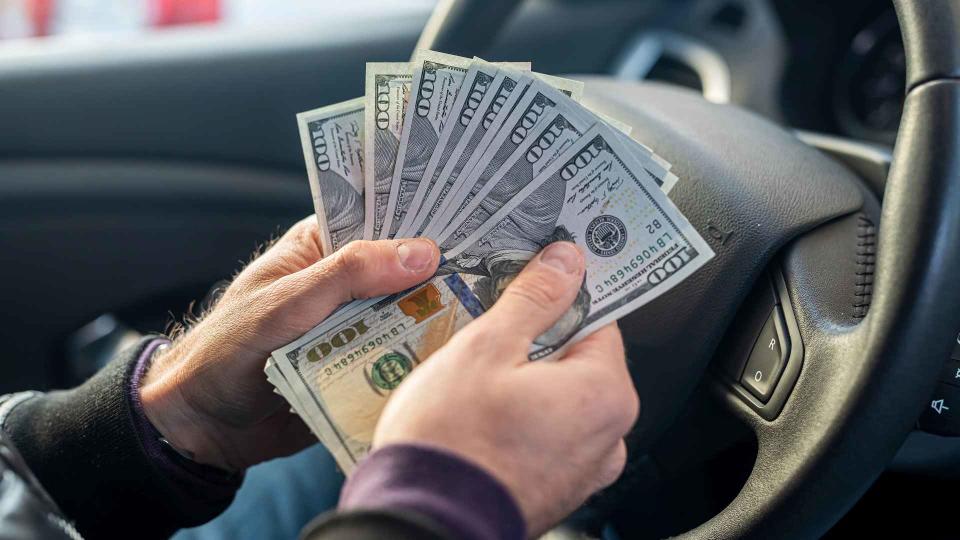Laura Beck
·4 min read
Going completely cash-only for a period of time has become a popular spending reset trend. But does only using physical currency truly curb impulsive purchasing and increase financial mindfulness? Or is it just really, really inconvenient? Or both?
Read More: I’m a Bank Teller: Here Are 10 Mistakes You Are Making With Your Banking
Check Out: 7 Things You Should Know If You Deposit More Than $10K Into Your Checking Account
GOBankingRates asked three professionals who embraced short-term cash-only lifestyles what they learned from the money experiment. Here’s what happened when they kicked their credit cards to the curb and went all-in on cash.
Sponsored: Owe the IRS $10K or more? Schedule a FREE consultation to see if you qualify for tax relief.
Less Temptation To Spend
All of the people we talked to found that going completely cash-only can curb impulsive spending by creating a psychological deterrent.
“Using cash for all transactions brought a psychological aspect to spending that I hadn’t considered before,” said Olivia Stettler, who went cash-only for a month. “The tactile experience of handing over physical money made each purchase feel more significant, leading to more thoughtful spending decisions.”
Richmond Harris, cash-only for a year, felt the same. “When you see physical bills leaving your wallet, it’s harder to part with them,” he said. “Temptation to spend impulsively dwindled. Counting out physical money adds a mindful layer many find beneficial for reducing wasteful spending.
Find Out: 6 Ways to Tell If You’re Financially Smarter Than the Average American
Better Budgeting
Both Stettler and Joe Manktelow-Pimm, who tried going cash-only for six months, say it’s tough to stick to a cash budget. To keep herself on the right path, Stettler used a simple method called the envelope system. She divided her spending into different categories, like groceries, entertainment, and bills. Then, she put a specific amount of cash for each category into separate envelopes.
Stettler found this system extremely helpful. It helped her stay on budget and, even more importantly, it made her more aware of her spending habits.
“This simple yet effective method kept me on track and made me more aware of my spending habits,” she said.
The idea is that when you see the actual cash in the envelope, it makes you think twice before spending it. It’s like a reality check for your budget, making you consider if you really need to spend that money.
No Interest Charges
Using only cash has a big advantage, as Manktelow-Pimm pointed out: “When you use cash, you don’t have to worry about interest charges on credit cards or loans. This can save you a lot of money in the long run.”
In simple terms, if you stick to cash, you won’t have to pay extra money in interest fees, which can add up if you use credit cards or loans.
Avoiding interest charges is a big plus, but it’s essential to weigh the pros and cons and consider your own financial habits and needs before going cash-only.
Limited Purchasing Power
Cash-only living, as Manktelow-Pimm pointed out, carries its share of drawbacks. “When you use cash, you are limited to the amount of money you have on hand,” he said.
This restriction can become a big disadvantage when you encounter an unexpected major purchase. With no credit or debit cards as fallback options, your spending becomes strictly confined to the physical currency in your wallet. This constraint can complicate larger purchases or emergencies, which mean an inconvenient trip to an ATM, along with the associated fees. You’ll have to plan ahead and have a well-stocked emergency fund if you’re going cash only.
Plus, in some situations, like when you’re shopping online or paying bills, using cash can be downright impossible.
“It’s a hassle in the digital age,” said Harris. “Online shopping or subscriptions become cumbersome.”
Difficulty Tracking Expenses
Manktelow-Pimm observed the difficulty of keeping tabs on expenses when using cash during his six-month experiment.
“It can be challenging to keep track of your expenses when you use cash,” he said. “You have to keep receipts and manually record your spending, which can be time-consuming.”
Managing your finances this way requires a great deal of discipline, particularly since you lack the convenience of relying on readily available bank statements.
No Credit Score Improvement
And cash-only living provides no credit boost, Manktelow-Pimm found.
“Using cash does not improve your credit score since you are not using credit,” he said.
While short stints of cash-only living can increase mindfulness, lengthy experiments can come with serious hassles. But as a periodic spending cleanse, it can reset wasteful habits and get your budget back on track, one $20 bill at a time.
More From GOBankingRates
I'm a Self-Made Millionaire: 5 Stocks You Shouldn't Sell
Costco: 9 Best Clothing Deals in February 2024
What Makes a Good Bank in 2024, According to a Banking Expert
I'm a Personal Finance Writer: These Are the Worst Money Mistakes I Made in 2023
This article originally appeared on GOBankingRates.com: I Paid for Everything With Cash for Months: Here’s What I Learned
